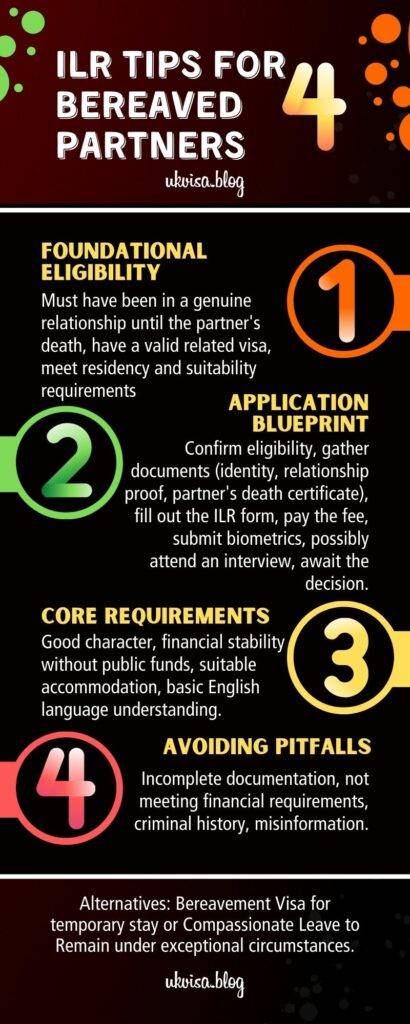Bereaved Partner ILR 2024: UK Visa ILR After Losing Spouse! Securing Indefinite Leave to Remain (ILR) as a bereaved partner in the UK in 2024 is a sensitive and critical process. This guide offers comprehensive support, detailing the eligibility criteria and application steps for those who have lost a spouse or civil partner. It provides insights into the process and addresses potential challenges, including reasons for ILR refusal. Tailored to aid applicants in this difficult period, the guide focuses on easing the journey towards securing ILR, ensuring that bereaved partners are well-equipped with the knowledge and understanding needed for a successful application.
Table of Contents
1. Requirements for Bereaved Partner ILR
Losing a spouse or civil partner is an incredibly challenging experience, made more complex when coupled with navigating the UK’s immigration system. This guide offers a comprehensive look at the Indefinite Leave to Remain (ILR) process for bereaved partners in the UK, detailing eligibility criteria, requirements, and the application process. Whether you are a foreign national grieving the loss of your British spouse or a UK sponsor aiding a bereaved partner, this guide aims to equip you with the necessary knowledge to confidently approach the ILR process.
Bereaved Partner Definition
A bereaved partner is a foreign national who has lost a British spouse or civil partner. The UK immigration system allows such individuals to apply for ILR, recognizing the unique challenges they face.
Between 2006 and 2023, a total of 1,207 applicants were granted ILR as bereaved partners, with 223 husbands and 984 wives receiving ILR due to the death of their spouse, civil, unmarried, or same-sex partner during the probationary period.
Role of Appendix FM
Appendix FM of the Immigration Rules outlines the specific provisions and criteria for bereaved partners seeking ILR, ensuring a fair and compassionate process.
Eligibility Criteria for Bereaved Partner ILR
- Relationship Evidence
- Proof of a genuine relationship until the partner’s death.
- Immigration Status
- Valid visa in spouse, civil partner, unmarried, or same-sex partner category at the time of the partner’s death.
- Residency Requirements
- Typically, a continuous 5-year period in the UK, subject to specific visa category.
- General Suitability
Meeting these criteria is crucial for a higher chance of ILR approval.
ILR Requirements and Compliance for Bereaved Partners
- Suitability
- Good character, adherence to immigration laws, no prior deception.
- Financial Stability
- Ability to maintain oneself without public funds.
- Accommodation
- Suitable living arrangements meeting health and safety standards.
- English Language
- Basic understanding, although exempt from standard requirements.
Complying with these requirements is vital for a successful ILR application, enabling bereaved partners to start anew in the UK.

2. Application Process for Bereaved Partner ILR
Applying for Indefinite Leave to Remain (ILR) as a bereaved partner involves a detailed process. Below is a step-by-step guide to ensure a smoother application experience.
Application Process Overview
- Verify Eligibility:
- Confirm that you meet the eligibility criteria for bereaved partner ILR.
- Gather Required Documents:
- Assemble all necessary supporting documents, including proof of identity, evidence of your relationship, and proof of your partner’s death.
- Complete the Application Form:
- Fill out the ILR application form (SET(M) or SET(O), as applicable) accurately.
- Pay the Application Fee:
- Ensure payment of the current Nationality and Immigration Charges, as listed on the UK Government website.
- Submit Biometric Information:
- Provide fingerprints and a photograph at a UKVCAS center.
- Attend an Appointment if Required:
- You may need to attend an in-person appointment for additional documentation or clarification.
- Wait for a Decision:
- The Home Office will review your application, a ILR processing typically takes up to 6 months.
Bereaved Partner ILR: Required Documents and Forms
- Proof of Identity
- Passport
- Relationship Evidence
- Marriage or civil partnership certificate
- Proof of Partner’s Death
- Death certificate
- Financial and Accommodation Evidence
- Bank statements, tenancy agreement
- Additional Relevant Documents
- Any other documents pertinent to your case
Bereaved Partner ILR Processing Times and Fees
- Processing Time:
- Fee (as of Jan 2024):
- The ILR application fee is £2,885, subject to change. Always verify the latest fee on the UK Government website.
By meticulously following these steps and ensuring all documents are in order, bereaved partners can navigate the ILR application process more effectively, enhancing their chances of a favorable decision.
3. Understanding ILR Refusal for Bereaved Partners
While applying for ILR as a bereaved partner, it’s crucial to be aware of common pitfalls that could lead to refusal. Understanding these reasons can help applicants prepare more robustly.
Common Reasons for ILR Refusal and How to Address Them
- Incomplete or Incorrect Documentation
- Ensure all documents, including identity proofs, relationship evidence, and financial records, are complete, accurate, and up-to-date.
- Failure to Meet Financial Requirements
- Provide comprehensive evidence of financial stability to demonstrate self-sufficiency without relying on public funds.
- Criminal History or Immigration Breaches
- Disclose any criminal or immigration history and provide context or evidence of rehabilitation.
- Misrepresentation or Deception
- Maintain honesty and transparency throughout the application process to avoid misleading information.
- Serious Criminal Convictions
- Be aware that imprisonment for at least 4 years may lead to refusal based on suitability grounds.
- Unpaid NHS Charges
- Ensure that all NHS charges amounting to £500 or more are cleared to avoid refusal on these grounds.
- Maintenance and Accommodation Issues
- Secure a valid maintenance and accommodation undertaking from a sponsor as required under the Immigration Rules.
Proactive Steps for a Strong Bereaved Partner ILR Application
- Review Documents:
- Carefully review all documents for accuracy and completeness.
- Gather Evidence:
- Collect comprehensive evidence of financial stability and accommodation arrangements.
- Be Forthcoming:
- Be forthcoming about any potential issues that might affect the application.
By proactively addressing these common reasons for refusal, bereaved partners can enhance their chances of a successful ILR application.
4. Alternatives and Conclusion for Bereaved Partner ILR
Navigating the UK immigration system following the loss of a partner can be challenging. If bereaved partner ILR isn’t an option, there are alternative paths to consider.
Alternatives to Bereaved Partner ILR
Compassionate Leave to Remain:
- Granted under exceptional circumstances.
- Available for those facing compelling reasons against returning home.
- Not specific to bereaved partners but a viable alternative.
Other Family Routes:
- Options include spouse, civil partner, or unmarried partner visas.
- Each route has distinct eligibility criteria and requirements.
- Suitable for those who don’t qualify for ILR.
Bereaved Partner ILR: Conclusion and Key Points
In this comprehensive guide, we’ve explored various aspects of the bereaved partner ILR in the UK:
- Bereaved partner ILR is the primary settlement route for those who have lost a British or settled status partner and meet the criteria.
- Essential requirements include fulfilling relationship, immigration status, residency, suitability, financial, and accommodation conditions, along with English language proficiency.
- Submitting a complete and accurate application with all required documentation is crucial.
- Common reasons for ILR refusal should be understood to avoid potential pitfalls.
- Alternatives like compassionate leave to remain and other family routes are available for those who don’t qualify for ILR.
Losing a partner is profoundly distressing, and the added complexity of immigration procedures can be overwhelming. While this guide aims to simplify the bereaved partner ILR process, seeking professional advice from immigration specialists or solicitors is highly recommended for personalized assistance and the best chance of securing your future in the UK.
5. FAQs: Navigating Bereaved Partner ILR Requirements
-
What if my bereaved partner ILR application is refused?
If refused, you can request an administrative review or explore other routes like a bereavement visa or compassionate leave. The administrative review challenges the decision if errors are believed to have been made.
-
Bereaved Partner ILR Application Processing Time?
Typically processed within six months, though complex cases may take longer. A complete and accurate application is crucial to avoid delays.
-
Can I switch to a bereaved partner ILR from another visa?
Yes, if you meet the eligibility criteria, including being in a genuine relationship with the deceased British citizen or settled partner.
-
How to prove the relationship with the deceased partner?
Provide marriage certificates, joint financial documents, photos, and third-party statements affirming the relationship.
-
Can I apply for ILR with dependent children?
Yes. Dependent children under 18, not leading an independent life, can apply with you if they meet the suitability criteria.
-
When can one submit a bereaved partner ILR application?
Applications are permissible at any point during the qualifying period of limited leave as a partner, provided the applicant still holds valid entry clearance or leave to remain as a partner.
-
Can I apply for a bereavement visa from outside the UK?
No. The application must be made from within the UK, complying with the eligibility and suitability requirements under Appendix FM.
-
What is the burden of proof for a bereaved partner ILR application?
The Home Office carries the burden of proof regarding doubts about the relationship. They must handle inquiries with care, particularly considering the applicant’s bereavement.
-
Does the Home Office make detailed inquiries during the application process?
Usually, detailed inquiries are not made, but if there are doubts about the relationship, the Home Office may investigate further.
-
How does the Home Office treat overstayers applying for ILR?
Overstaying due to bereavement is treated with compassionate consideration, though it’s essential to relate the overstaying period to bereavement.
These FAQs provide deeper insights into the ILR application process for bereaved partners, addressing common queries and concerns to assist applicants in navigating this challenging time. For further details relating to Bereaved Partner ILR requirements please refer Gov.UK Appendix FM Immigration Rules.

